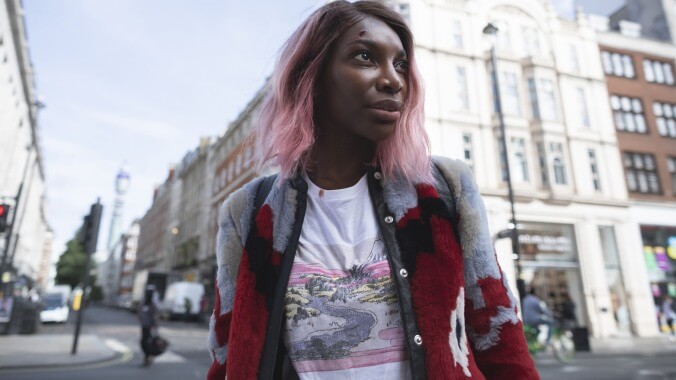I May Destroy You is a blessedly thorough look at sexual abuse and healing

HBO’s newest half-hour dramatic series I May Destroy You is a breathtakingly thorough examination of not only sexual abuse but also sexual exploitation and the culture of rape that has long perpetuated it. Creator, writer, and star Michaela Coel has channeled her own experiences with assault into a work that is honest, humane, and offers zero answers to the question, how does one correctly deal with their own assault? Because as it turns out, there isn’t a perfect formula for healing, despite patriarchal rhetoric that would suggest otherwise.
Coel’s Arabella is a lot of things at once—a burgeoning author, an unrepentant party girl, a social media sensation, and a millennial caricature of a woman, to name just a few. While taking a break from a marathon writing session, she meets up with a friend at a local bar and dives into a period of intense carousing. Suddenly Arabella’s night out begins fading to black as she wanders in an out of consciousness. When we see her again, she’s back at her computer, still clad in the outfit from the night before, now the owner of a freshly bleeding wound on her forehead and a newly shattered phone—neither of which she remembers earning. As she struggles to recall the details of the night before, Arabella begins to experience horrifying flashbacks involving a strange man towering above, seemingly forcing himself on her. Once she’s pieced together the fragments of her embattled memory, the young creative correctly concludes that she was drugged and subsequently raped by a stranger.
The season chronicles Arabella’s rather messy path toward healing, aided largely by her two ride-or-die friends, Kwame (Paapa Essiedu) and Terry (absolute powerhouse Weruche Opia). It’s the phase of a harrowing experience that we rarely get to see in television: what life looks and feels like after a major violation and temporary loss of agency. In the event that we, as viewers, do get to witness the rebuilding process, it tends to follow a familiar pattern of highly touted self-care—that is to say, lots of therapy, some yoga, a possible support group, and, if we’re lucky, a nice dose of catharsis. While those things certainly serve a purpose here, Coel goes the extra mile to survey the ways our identities can impact and, at times, complicate our recovery. As a Black, highly visible survivor, Arabella becomes a beacon for others who are struggling with similar trauma. As noble or (ugh) “strong” as that may sound to them, her sudden role as a public inspiration leaves her little room to assess her own boundaries and process her lingering fear, which manifests in a number of fairly unhealthy ways.
That borderline toxicity—fighting with friends, losing herself in her social media presence—isn’t presented with judgment (even when she interrupts a doctor’s visit to post a buzzword-heavy video to her Instagram), but as a testament to how handling abuse “responsibly” doesn’t negate victim-blaming, shaming, and the number of systems that work to protect abusers. Arabella reports the crime and publicly holds an abuser accountable (which should please detractors who like to ask, “Why didn’t you go to the police right away?” when victims try to share their experiences). Yet none of that serves as a cure-all, nor does it alleviate her struggles with her abuse. It’s affirming in a very communal way, having a figure like Arabella involved in modern conversations about rape culture. It’s important to consider how victims seek and sometimes struggle to find peace when all the widely prescribed avenues still don’t work. As this show is quick to confirm, recovery is not a monolith.
As a writer and actor, Coel captures how difficult of a journey healing is for those who have been sexually exploited. Through Kwame and Terry, both of whom endure their own instances of deception, I May Destroy You showcases the vital role consent plays in one’s agency, and how the lack of it in any act—whether it involves the agreed-upon parameters of a threesome or continued engagement after a previously approved tryst—drastically changes matters. The way the series treats every example as a serious transgression sets it apart from others that attempt to address abuse without the necessary range.
While the outcome is overwhelmingly positive thanks to an earnest, talented cast, there are a few characters that register as loose ends or don’t contribute much to the story beyond an affable presence. Pacing also proves to be a continued challenge for stories with seasons that exceed 10 episodes, which Coel managed to avoid with her succinct comedic gem Chewing Gum. The temptation to devote enough time and consideration to certain plot points is understandable, but the result—full episodes dedicated to minute elements for the sake of providing a different perspective—can drag down the momentum, no matter how fantastic the performances are.
The episodes that do fuel the show’s main arcs are brilliantly executed, including a Sliding Doors-esque finale that has Arabella face off with her rapist. Much-needed moments of levity, courtesy of Coel’s expert comic hand, add a holistic, human touch to a tragedy that devastates, but never wholly defines a person.